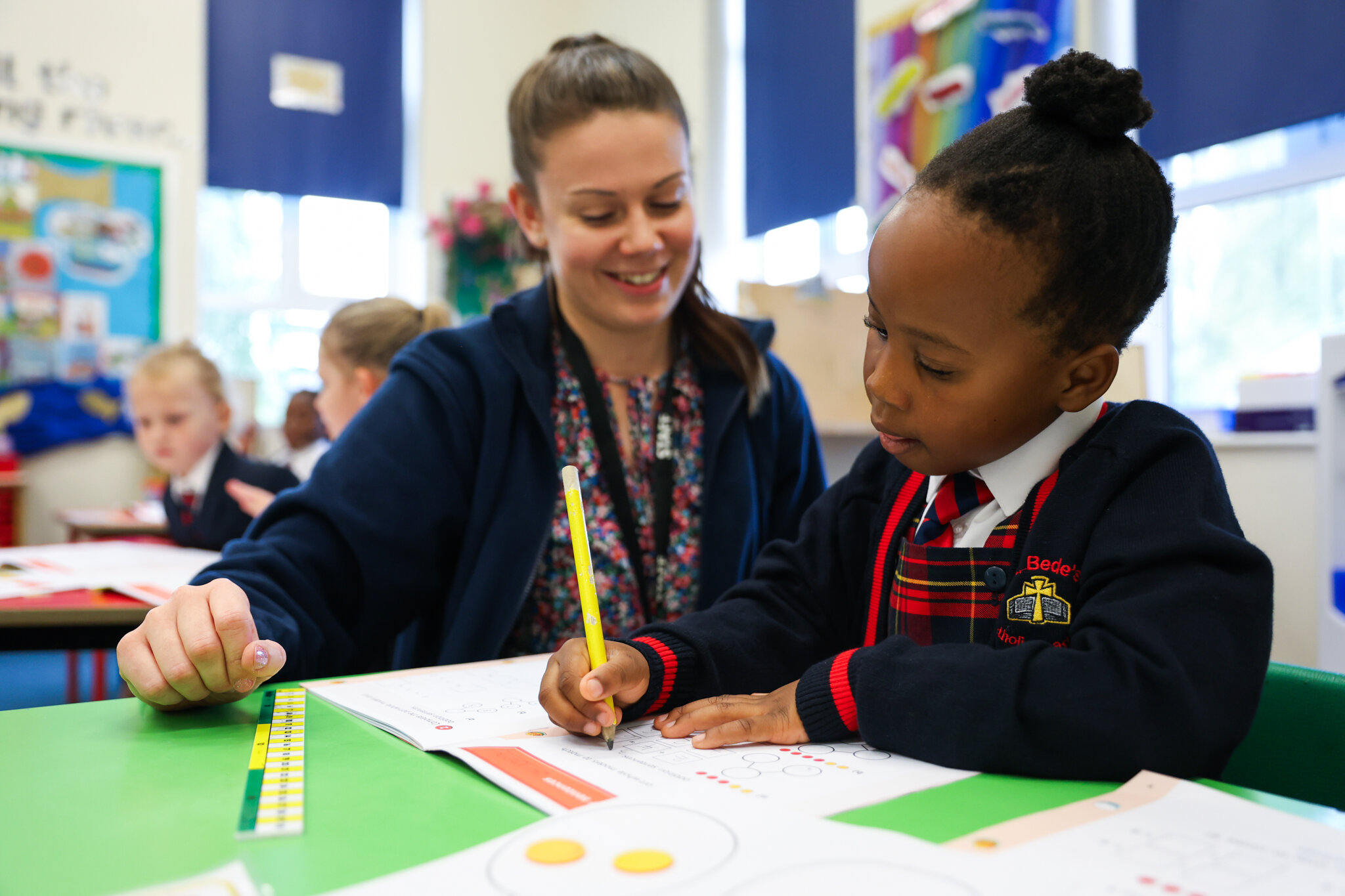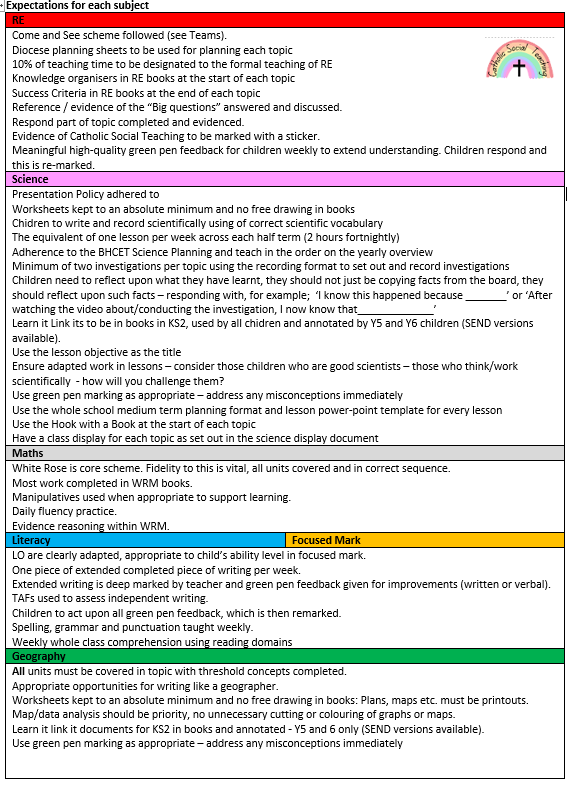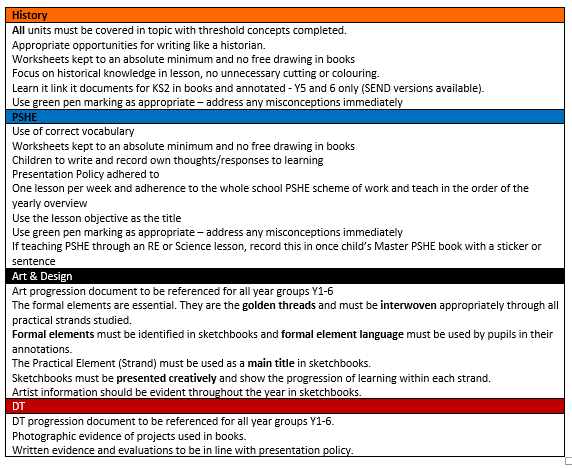Teaching and Learning at St Bede’s Catholic Academy
Trust Vision
Our schools are places of excellence-providing service and witness to children, their families, and the wider Catholic community. As a family of schools, we enrich the learning experiences of all our young people to enable them to achieve their full potential.
Our Aims
Teaching and learning at St Bede’s promotes best practice and establishes consistency in teaching and learning across the whole school. It aims to ensure that all children are provided with high quality learning experiences, leading to a consistently high level of pupil achievement and attitude.
We expect consistency in the quality of teaching and learning across our school so that all children make good progress – our children deserve nothing less.
Learning and long-term memory
Teachers employ a wide range of different strategies to ensure that learning ‘sticks’ so that ‘retrieval has a greater impact on memory than re-study’.
Highly effective lessons will feature:
- Effective planning which is scaffolding to meet the needs of all pupils.
- Clear explanations and instructions, anticipating misconceptions from pupils.
- High quality teacher input and modelling.
- Lessons build on prior knowledge and reference next steps.
- Reference to future learning so that children know how this lesson will help them in their future work.
- A clear learning objective shared with the children visually and orally.
- Questioning to actively engage children through approaches such as Cold Calling; No opt Out; Say it again, better. These strategies include the use of signs, visual symbols, songs, rhymes, repetition (I say/you say) and mnemonics.
- A clear and defined outcome (end point) which will be achieved by the end of the lesson.
- Strategies of knowledge retrieval to help children know more and remember more.
- A recap of learning throughout the lesson.
- Making connections to prior learning
- Challenge for all children, and the expectation that all children can succeed.
- High expectations of behaviour for learning and all children being ‘learning ready’ at the beginning of, and throughout each lesson.
- Children engaged in their learning throughout the whole lesson, no waiting or early finishers.
- Transitions which are seamless and so that no learning time is lost.
- Full adherence to the presentation policy.
Resilience- An atmosphere of resilience and risk-taking should pervade in all lessons.
‘Stuck? Good, now we’ll really learn something!’
- This means that both staff and pupils are not afraid to make mistakes or to admit that they are unsure about something. A variety of overt strategies can be used to ensure this – For example, ’most useful error of the day’
- Learning how, to look ‘inwards’ first when faced with challenges or problems to overcome, such as with ‘three before me’.
The Learning Environment –our classrooms reflect our Catholic identity and our high expectations
- The focal point of each room is the sacred space, which is changed according to the Liturgical year.
- An attractive and high-quality reading area illustrates our commitment to promoting the children’s love of reading.
- Our classrooms are tidy, well organised, and clutter-free and set the culture for high quality learning.
- Children’s tables are arranged so that children can work in groups. However, in certain circumstances, it is appropriate for them to be arranged differently-and there is a clear rationale behind this.
- Displays are current, interactive, aspirational and attractive with a reasonable balance between displaying children’s work and providing prompts for learning.
- All classrooms have: a ‘Working Wall’, English prompts (e.g.: letter formation, vocabulary, and grammar prompts), Maths prompts (e.g.: number bonds, times tables, place value). They will also display question prompts and fundamental of lesson design.
- All classrooms will have quality reading areas and a display of the classes reading spine.
- All resources should be motivating, attractive and accessible. Teachers do not rely heavily on worksheets and published schemes but adapt materials to suit the needs of children.
Shared Areas
- All shared areas are tidy, well organised, and clutter-free.
- Displays in corridors and other shared areas should be current and reflect the whole curriculum.
Monitoring
- The leadership team will monitor the high-quality teaching and learning throughout the school to ensure our children receive the best they deserve.
- This will include Book looks, pupil progress meeting, Learning Walks, talking to children and Lesson Observations.
- Instructional feedback and coaching are given to teachers as our commitment to professional development.
- Performance management links to the school development plan and Trust priorities.
Effective learning results in:
• Knowing you have succeeded.
• Feeling you can do more.
• Explaining what you have learned.
• Applying it to other situations.
• Teaching it to someone else.
• Feeling good about yourself.
Presentation:
All pupils should practise using a ruler and improve their underlining skills on a regular basis. The following principles apply to all pupils but younger pupils in Key Stage 1 will not be expected to underline their work.
In all written work, pupils should be reminded to:
- Write the long date on the top line of the page in regular sized writing: e.g., Tuesday 1st September 2023.
- LO and title are not required.
- A line is left between date and title/LO.
- A line is left between title/LO and start of work.
- Start writing from the left-hand side/next to the margin on every page.
- A learning objective should not be written by the child in KS1 or SEND children in KS2.
- Poor letter formation will be always be addressed by teacher/TA.
- Teachers to model correct handwriting style in books and on board.
- Practise and improve their ruler and underlining skills on a regular basis.
- Draw one straight line through any mistakes made, ensuring they don’t cross out or scribble over any errors and ensure they don’t use an eraser on their work. Teachers/TA will rub out only.
- Children will write neatly, following the school’s handwriting formation from ‘Letter-join’ in all their work.
- Complete all their written work in pen, once they have been awarded their pen license for neat and sustained and fluent formation.
- Always use pencil when drawing, constructing tables, diagrams and charts.
- No free drawing in science, geography or history books.
In maths work, pupils should be reminded to:
- Write the short date for their work, remembering to add 0 for place value: For example, 01.09.21 instead of 1.9.21.
- Use pencil for all work.
- Use a ruler when drawing lines, constructing tables, diagrams and charts.
- Leave one empty line between calculations.
- Write one digit per square on the page, separating question numbers from digits within the calculation with bracket NOT a full stop.
- Children are not to use a rubber in their maths books.
Monitoring
The Senior Leadership Team and Subject Leaders will collect examples of children’s work on a regular basis to ensure that the policy is being implemented consistently. This ensures that the policy leads to good practice in facilitating effective feedback, learning and teaching.
Appendix 1: Teachers’ Standards
Teachers make the education of their pupils their first concern and are accountable for achieving the highest possible standards in work and conduct. Teachers act with honesty and integrity; have strong subject knowledge, keep their knowledge and skills as teachers up-to-date and are self-critical; forge positive professional relationships; and work with parents in the best interests of their pupils.
PART ONE: TEACHING A teacher must:
1. Set high expectations which inspire, motivate and challenge pupils
- establish a safe and stimulating environment for pupils, rooted in mutual respect
- set goals that stretch and challenge pupils of all backgrounds, abilities, and dispositions
- demonstrate consistently the positive attitudes, values and behaviour which are expected of pupils.
2. Promote good progress and outcomes by pupils
• be accountable for pupils’ attainment, progress, and outcomes
• be aware of pupils’ capabilities and their prior knowledge, and plan teaching to build on these
• guide pupils to reflect on the progress they have made and their emerging needs
• demonstrate knowledge and understanding of how pupils learn and how this impacts on teaching
• encourage pupils to take a responsible and conscientious attitude to their own work and study.
3. Demonstrate good subject and curriculum knowledge
• have a secure knowledge of the relevant subject(s) and curriculum areas, foster, and maintain pupils’ interest in
the subject, and address misunderstandings
• demonstrate a critical understanding of developments in the subject and curriculum areas, and promote the value
of scholarship
• demonstrate an understanding of and take responsibility for promoting high standards of literacy, articulacy, and
the correct use of standard English, whatever the teacher’s specialist subject
• if teaching early reading, demonstrate a clear understanding of systematic synthetic phonics
• if teaching early mathematics, demonstrate a clear understanding of appropriate teaching strategies.
4. Plan and teach well-structured lessons
• impart knowledge and develop understanding through effective use of lesson time
• promote a love of learning and children’s intellectual curiosity
• set homework and plan other out-of-class activities to consolidate and extend the knowledge and understanding
pupils have acquired
• reflect systematically on the effectiveness of lessons and approaches to teaching
• contribute to the design and provision of an engaging curriculum within the relevant subject area(s).
5. Adapt teaching to respond to the strengths and needs of all pupils
• know when and how to differentiate appropriately, using approaches which enable pupils to be taught effectively
• have a secure understanding of how a range of factors can inhibit pupils’ ability to learn, and how best to overcome
these
• demonstrate an awareness of the physical, social, and intellectual development of children, and know how to
adapt teaching to support pupils’ education at different stages of development
• have a clear understanding of the needs of all pupils, including those with special educational needs; those of high
ability; those with English as an additional language; those with disabilities; and be able to use and evaluate
distinctive teaching approaches to engage and support them.
6. Make accurate and productive use of assessment
• know and understand how to assess the relevant subject and curriculum areas, including statutory assessment
requirements
7. Make use of formative and summative assessment to secure pupils’ progress
• use relevant data to monitor progress, set targets, and plan subsequent lessons
• give pupils regular feedback, both orally and through accurate marking, and encourage pupils to respond to the
feedback
8. Fulfil wider professional responsibilities
• make a positive contribution to the wider life and ethos of the school
• develop effective professional relationships with colleagues, knowing how and when to draw on advice and
specialist support • deploy support staff effectively
• take responsibility for improving teaching through appropriate professional development, responding to advice
and feedback from colleagues
• communicate effectively with parents about pupils’ achievements and well-being.
PART TWO: PERSONAL AND PROFESSIONAL CONDUCT
A teacher is expected to demonstrate consistently high standards of personal and professional conduct.
The following statements define the behaviour and attitudes which set the required standard for conduct throughout a teacher’s career.
Teachers uphold public trust in the profession and maintain high standards of ethics and behaviour, within and outside school, by:
- treating pupils with dignity, building relationships rooted in mutual respect, and always observing proper boundaries appropriate to a teacher’s professional position
- having regard for the need to safeguard pupils’ well-being, in accordance with statutory provisions showing tolerance of and respect for the rights of others not undermining fundamental British values, including democracy, the rule of law, individual liberty and mutual respect, and tolerance of those with different faiths and beliefs
- ensuring that personal beliefs are not expressed in ways which exploit pupils’ vulnerability or might lead them to break the law.
Teachers must have proper and professional regard for the ethos, policies, and practices of the school in which they teach and maintain high standards in their own attendance and punctuality.
Teachers must understand, and always act within, the statutory frameworks which set out their professional duties and responsibilities.



